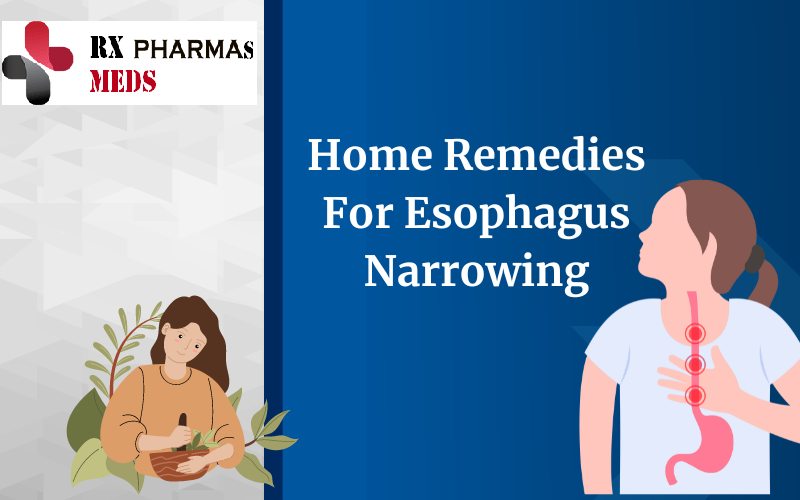The abnormal narrowing of the esophageal lumen is referred to as esophageal structure and is commonly described by patients as difficulty in swallowing. It affects almost 40% of the adults. It is also estimated to occur in 7 – 23% of patients with untreated reflux disease. Gastroesophageal reflux disease accounts for approximately 70-80% of all cases of esophageal stricture. It needs immediate attention, and doctor consultation along with some natural remedies. This topic is about the home remedies for esophagus narrowing, and what happens when you have this condition.
What is Esophagus Narrowing?
GERD (Gastroesophageal reflux disease) may lead to scarring over time as the esophagus tissue attempts to heal itself. The scar tissue is thicker than the lining of the esophagus, causing it to constrict from the places the scar tissue is formed. Therefore, this narrowing in the esophagus makes it difficult to swallow, and hence, is called a stricture.
Almost 80% of esophageal strictures are caused due to GERD. Strictures act as a barrier and can eventually stop food as well as liquids from making their way down to the esophagus and into the stomach.
Symptoms of Esophagus Narrowing:
The most typical symptoms of esophagus narrowing are:
- Pain while swallowing
- Difficulty swallowing
- Unintended weight loss
- Chest pain
- Regurgitation caused after consuming foods or liquids
- Heartburn
- Frequent hiccups or burping (Try some home remedies to get rid of hiccups. )
- Feeling like something is stuck in your chest and esophagus tract after eating
Best Home Remedies for Treating Esophageal Stricture
Below-mentioned are some home remedies for treating esophageal stricture:
Avoid Foods That Increases Reflux:
One must avoid eating excessive amounts of foods that are known to worsen the symptoms of gastroesophageal reflux. Some of these foods include – caffeine, alcohol, mint-flavored foods, chocolate, etc.
Eliminate Excess Weight:
Consult a licensed medical healthcare provider to carry out an appropriate routine of exercise and an anti-inflammatory diet to help maintain a healthy weight.
Use the Best Practice of Pill-Taking Habits:
Always take a pill with an adequate amount of water. Don’t lie down for at least half an hour after taking any pill.
Stop Smoking:
Smoking is not only bad for your esophagus but also for your lungs and overall body health. People with past medical history are strictly prohibited from smoking. Consult a doctor if you need any help for quitting your smoking addiction.
Do Not Lie Down After Eating:
Wait for at least 3 hours after eating, then lie down or go to bed. It helps the food gets digested easily in the stomach.
Avoid Certain Medications:
Avoid taking some pain relievers and antibiotics, in addition to some other medicines, as these might cause adverse complications in the body. Therefore, it is advised to consult a healthcare provider before taking any medications.
Raise the Head of the Mattress:
Place wooden blocks under your bed or mattress instead of using pillows, which may help you to lie down comfortably and elevate the position of your head. Aim for an altitude of 6 to 8 inches. Raising your head by only using pillows is not that effective. Therefore, using wooden blocks placed under the bed can be a better option.
Don’t Drink Carbonated Beverages:
Carbonated beverages will make you burp, which sends acid into the esophagus. Drink flat water instead of sparkling water.
Do Not Move Too Fast:
Avoid vigorous exercise for a couple of hours after eating. An after-dinner stroll is fine, but a more exhausting workout, especially if it involves bending over, can send acid into your esophagus.
Eat Slowly:
When the stomach is full, there can be more reflux into the esophagus. If the method called grazing fits into your schedule, you must try it. Eat small meals more frequently rather than three large meals daily.
When To See A Doctor
Doctors may use an upper GI endoscopy to spot an esophageal stricture. One should see a licensed medical healthcare professional if he/she experiences any symptoms causing esophagus narrowing. A physician will examine the upper GI tract, including the stomach and esophagus.
Various treatments can help improve esophageal strictures effectively. If individuals have esophageal stricture as a result of GERD, they may need to make changes to their lifestyle or diet to handle the condition throughout their lifetime. In addition, the above-mentioned home remedies can be helpful for patients with esophagus narrowing problems.

